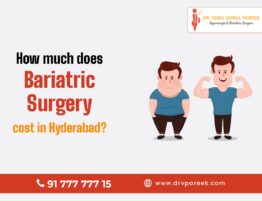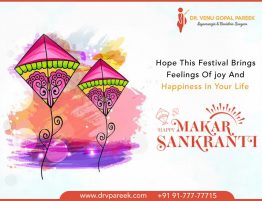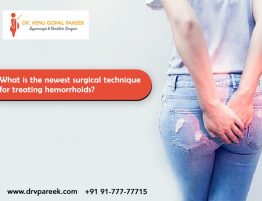
Haemorrhoids occur in about 55-60% of the Indian population and can affect men and women of all ages. Many people feel uncomfortable and hesitate to discuss their symptoms with the doctor. Unfortunately, if not treated, haemorrhoids can develop so far that painful surgery is the only option left. Haemorrhoids can be severe enough to disrupt your daily routine. You may have to limit or avoid some activities due to haemorrhoid complaints.
They can be treated at any age, no matter how hectic your life is. You have many options today which are safe, effective and minimally invasive. These procedures allow you to control this condition. Laser reliable procedure is more simple and less invasive than traditional surgical procedures that require an extended hospital stay and recovery time.
Dr Venu Gopal Pareek is dedicated in providing the latest treatment options for piles and bariatric surgeon. During the examination, the surgeon will discuss which treatment option is best for your specific needs and will work with you to develop an individual treatment plan. This Blog provided by Dr Venu Gopal Pareek discuss piles and what treatments are available at the hospital.

What are Piles?
Piles or haemorrhoids are swellings that contain dilated blood vessels located in or around the rectum and anus. Haemorrhoids are caused due to increased pressure on the anus.
How do Piles Occurs?
When veins in the lower rectum and anus expand under pressure, they may swell or bulge resulting in haemorrhoids. The force that makes swell can be caused by:
- Pushing hard to defecate
- Sitting on the toilet for a long time
- Chronic diarrhoea
- Chronic constipation
- Anal intercourse
- Obesity
- Pregnancy
What are The Symptoms?
- Blood in stools
- Painful hard lump in the anus
- Pain while defecating
- Itching sensation around the anus
- Mucus discharge while defecating
- Feeling of fullness in the bowels even after passing a stool
Types of Piles:
Piles can be classified into four different categories, namely internal, prolapse, external, and thrombosed.

- Internal Hemorrhoids: They are rooted in the rectum and are not visible. They may not cause pain, but symptoms of anal bleeding indicate their presence.
- External Hemorrhoids: They form in the anal outer lining and cause severe discomfort and pain. Sometimes they are invisible, and sometimes they develop like lumps. They can also form blood clots within the mass that slips down.
- Prolapsed Hemorrhoids: When internal haemorrhoids swell and bulge outside your anus, the situation appears as prolapsed haemorrhoids. These lumps cause discomfort or pain as well as itching and burning sensation.
- Thrombosed Hemorrhoids: The swelling bulge around the anus is a blood clot within the hemorrhoidal tissue. Due to lack of blood flow to rectal tissue, urgent thrombotic haemorrhoids must be consulted to avoid serious complications.
Diagnosis Of Piles:
External haemorrhoids are easily recognized when seen. The diagnosis of internal haemorrhoids can include clinical rectal examination (the doctor inserts gloves and sliding fingers into your rectum).
Treatment Of Piles:
Treatment care varies from person to person, depending on the extent of haemorrhoid damage.
The First Line Of Treatment:
For people suffering from this condition, the recommended corrective solution is to include a diet high in fibre and avoid processed foods. Diet should be made to reduce the chance of constipation. That’s why grains, vegetables, fruits and more. They must always be part of the diet. A doctor can also recommend dietary fibre supplements.
Apart from diet, it is essential to drink lots of water. It is recommended to drink at least 7-8 glasses of water a day. To reduce swelling in the area and to relieve pain and itching, you can take a warm shower. Even a gentle Vaseline application to the affected area can help. Another way to reduce swelling is to use a cold compress over the inflamed area.

If home remedies do not give positive results, it is necessary to consult with the surgeon. Surgery to remove haemorrhoids can do if other treatments fail.
There are several types of treatment for haemorrhoids. You can ask a doctor to buy over-the-counter gels and creams to treat symptoms. All of these treatment options only cover the symptoms of the disease, not the treatment of the disease. In most cases, when symptoms are severe, the choice for surgery is a wise choice. Surgical options for treating haemorrhoids include:
- Photocoagulation
- Hemorrhoidectomy
- Sclerotherapy
- Rubber Band Ligation
- Laser treatment
A particular problem with medical ointments is that they do not affect internal haemorrhoids. Therefore, surgery is the only option if oral medications are ineffective. Laser surgery is one of the most preferred, latest methods, and painless surgery for piles.
Laser Treatment for Piles:
Lasers procedure works using Doppler to find blood supply to haemorrhoids. This procedure causes less pain and bleeding
Laser Piles Surgery How Does it Work?
If the definition of surgery is “incision and stitching” for you, then this isn’t even surgery! That is the beauty of lasers. There are no injuries and no stitches!
In laser treatment, the doctor passes the fibre through the natural anal canal, and laser energy transferred to the mass of the haemorrhoids. This controlled laser energy emission reaches the submucosal zone, causing the haemorrhoid mass to shrink.
Also, fibrotic reconstruction creates new connective tissue that ensures that the mucosa is attached to the underlying tissue. It prevents the recurrence of prolapse piles. After the procedure, there is no foreign body left in the body.

Benefits Of Treating Piles With Laser Surgery:
- The patient feels less pain compared to other procedures
- No hospitalization needed for this procedure. Patients can get discharged on the same day
- Laser surgery is much safer compared to traditional surgical options
- Because blood vessels in the rectal area get closed with a laser, minimal bleeding occurs during the procedure.
- The risk of other medical complications is minimal
- Surgeons have many options for using laser light effectively and thereby increasing the chances of success through surgery
- Not too complicated and risky
- Heal wounds quickly
- Because this procedure does not require general anaesthesia, recovery is much faster
With so many benefits, laser surgery is an option that must be considered by a patient with many benefits.
What Are The Effects Of Piles If Left Untreated?
If left untreated, haemorrhoids can cause complications such as anaemia and weakness due to chronic blood loss during bowel movements. There is a risk of strangulation haemorrhoids, where prolapsed blood flow is interrupted by anal sphincter contractions.
Conclusion:
Haemorrhoids are common, and there are unique treatments and lifestyle choices that can help you avoid them. If your haemorrhoids still have pain or your haemorrhoids bleed, consult Dr Venu Gopal Pareek for the best painless treatment options for you.
Dr Venu Gopal Pareek is a specialist in Hyderabad for the exclusive treatment of piles, fissures, and fistulas. The doctor is a Specialized doctor who performs advanced laser surgery with sophisticated equipment at affordable prices.
The doctor understands the problems you need to go through and ensure you get the best laser treatment with the fastest results. We give each patient personal attention to ensure they have a pleasant experience with the doctor. Contact Dr Venu Gopal Pareek at +91 91-777-77715 for the painless surgery for piles and best treatment option.







